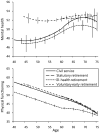From midlife to early old age: health trajectories associated with retirement
- PMID: 20220519
- PMCID: PMC3204317
- DOI: 10.1097/EDE.0b013e3181d61f53
From midlife to early old age: health trajectories associated with retirement
Abstract
Background: Previous studies report contradictory findings regarding health effects of retirement. This study examines longitudinally the associations of retirement with mental health and physical functioning.
Methods: The participants were 7584 civil servants from the Whitehall II cohort study aged 39-64 years at baseline and 54-76 years at the last follow-up. Self-reported mental health and physical functioning were assessed using the Short Form Medical Outcomes Survey questionnaire, and the scales were scored as T-scores (mean [SD] = 50 [10]). Retirement status and health were assessed with 6 repeated measurements over a 15-year period.
Results: The associations between retirement and health were dependent on age at retirement, reason for retirement, and length of time spent in retirement. Compared with continued employment, statutory retirement at age 60 and early voluntary retirement, respectively, were associated with 2.2 (95% confidence interval = 1.7 to 2.8) and 2.2 (1.7 to 2.7) points higher mental health and with 1.0 (0.6 to 1.5) and 1.1 (0.8 to 1.4) points higher physical functioning. Retirement due to ill health was associated with poorer mental health (-0.7 points [-1.62 to 0.2]) and physical functioning (-4.5 points [-5.1 to -3.9]). Within-subject analyses suggested a causal interpretation for statutory and voluntary retirement, but health selection for retirement due to ill health.
Conclusions: Longitudinal analyses of repeat data suggest that health status improves after statutory and voluntarily retirement, although the improvement seems to attenuate over time. By contrast, the association between retirement due to ill health and subsequent poor health seems to reflect selection rather than causation.
Figures



Similar articles
-
Is retirement good or bad for mental and physical health functioning? Whitehall II longitudinal study of civil servants.J Epidemiol Community Health. 2003 Jan;57(1):46-9. doi: 10.1136/jech.57.1.46. J Epidemiol Community Health. 2003. PMID: 12490648 Free PMC article.
-
Changes in physical and mental health functioning during retirement transition: a register-linkage follow-up study.Eur J Public Health. 2018 Oct 1;28(5):805-809. doi: 10.1093/eurpub/cky013. Eur J Public Health. 2018. PMID: 29425301
-
Socioeconomic inequality in recovery from poor physical and mental health in mid-life and early old age: prospective Whitehall II cohort study.J Epidemiol Community Health. 2018 Apr;72(4):309-313. doi: 10.1136/jech-2017-209584. Epub 2018 Feb 8. J Epidemiol Community Health. 2018. PMID: 29439189 Free PMC article.
-
The association of cognitive performance with mental health and physical functioning strengthens with age: the Whitehall II cohort study.Psychol Med. 2010 May;40(5):837-45. doi: 10.1017/S0033291709991024. Epub 2009 Sep 1. Psychol Med. 2010. PMID: 19719898 Free PMC article.
-
Voluntary work for the physical and mental health of older volunteers: A systematic review.Campbell Syst Rev. 2020 Oct 23;16(4):e1124. doi: 10.1002/cl2.1124. eCollection 2020 Dec. Campbell Syst Rev. 2020. PMID: 37016617 Free PMC article. Review.
Cited by
-
Employment and health after retirement in Japanese men.Bull World Health Organ. 2018 Dec 1;96(12):826-833. doi: 10.2471/BLT.18.215764. Epub 2018 Sep 27. Bull World Health Organ. 2018. PMID: 30505030 Free PMC article.
-
Work-Hour Trajectories and Depressive Symptoms among Midlife and Older Married Couples.Work Aging Retire. 2018 Jan;4(1):108-122. doi: 10.1093/workar/wax028. Epub 2017 Dec 19. Work Aging Retire. 2018. PMID: 29610672 Free PMC article.
-
Mental retirement and health selection: Analyses from the U.S. Health and Retirement Study.Soc Sci Med. 2017 Apr;178:78-86. doi: 10.1016/j.socscimed.2017.01.019. Epub 2017 Jan 22. Soc Sci Med. 2017. PMID: 28213301 Free PMC article.
-
Occupational social class trajectories in physical functioning among employed women from midlife to retirement.BMC Public Health. 2019 Nov 14;19(1):1525. doi: 10.1186/s12889-019-7880-0. BMC Public Health. 2019. PMID: 31727156 Free PMC article.
-
Does retirement trigger depressive symptoms? A systematic review and meta-analysis.Epidemiol Psychiatr Sci. 2021 Dec 1;30:e77. doi: 10.1017/S2045796021000627. Epidemiol Psychiatr Sci. 2021. PMID: 35048820 Free PMC article.
References
-
- Drentea P. Retirement and mental health. J Aging Health. 2002;14:167–194. - PubMed
-
- Mojon-Azzi S, Sousa-Poza A, Widmer R. The effect of retirement on health: a panel analysis using data from the Swiss Household Panel. Swiss Med Wkly. 2007;137:581–585. - PubMed
-
- Hyde M, Ferrie J, Higgs P, Mein G, Nazroo J. The effects of pre-retirement factors and retirement route on circumstances in retirement: findings from the Whitehall II study. Ageing & Society. 2004;24:279–296.
-
- Buxton JW, Singleton N, Melzer D. The mental health of early retirees-- national interview survey in Britain. Soc Psychiatry Psychiatr Epidemiol. 2005;40:99–105. - PubMed
Publication types
MeSH terms
Grants and funding
LinkOut - more resources
Full Text Sources
Medical

